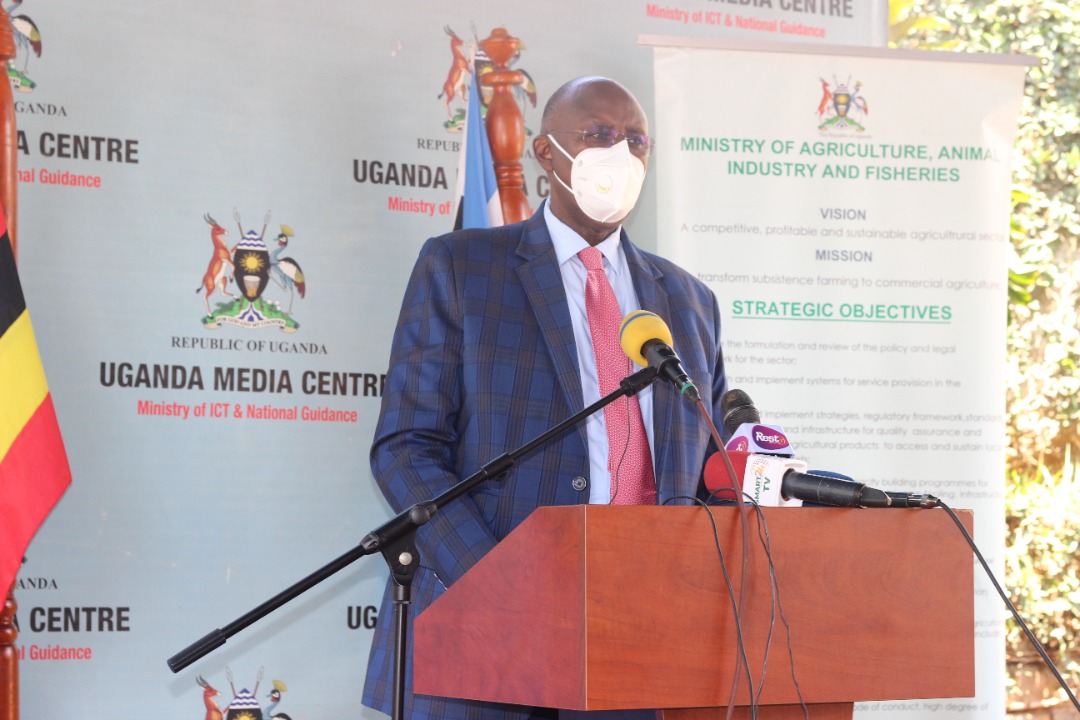News
Uganda readies for World Food Day with concern over growing population
Uganda joins the rest of the world to commemorate the 41 st WFD as one of the 193 countries that embraced the 2030 agenda for sustainable Development and 17 sustainable Development Coals.
According to LT COL (RTD) Rwamirama Bright the State Minister for Animal Industry, Uganda is keen to live up to its international commitments, one of which is achieving Zero Hunger by ensuring food security and nutritious diets for all its people.
While addressing the press in Kampala, Rwamirama said the Ugandan diet is mainly composed of plantain, starchy roots (cassava, sweet potatoes), and cereals (maize, millet, sorghum), Pulses, nuts, and green leafy vegetables complement the diet.
“In urban areas which are undergoing a nutrition transition, food consumption patterns are changing and rice is gaining importance. Overall, the diet remains poor in micronutrient-rich foods. Therefore, World Food Day presents an opportunity for the country to reflect on its global commitments to achieve Sustainable Development Goal (SDG) 2: End hunger, achieve food security and improved nutrition and promote sustainable agriculture” the minister said.
Uganda held the National Food Systems Dialogue in September 2021 presided over by the President- His Excellency- Gen. Yoweri Kaguta Museveni. During the Dialogue, the Office of the Prime Minister together with the Ministry of Agriculture Animal Industry and Fisheries enumerated focus areas for support and investment to propel food systems transformation.
It’s envisaged that these food systems issues will provide a united platform to launch bold new actions to transform the way how the world produces, markets and consumes food, and support accelerated progress on all 1 7 SDGs, each of which relies to some extent on healthier, more sustainable and equitable food systems.
“The country has developed several policies that support the agro-food systems i.e. National Food and Nutrition Policy 2003, the National Agricultural Policy 201 3, National Action Plan for Nutrition 2015, and the National Agricultural Extension Policy 2015, all addressing issues on natural resource management issues, food security and call for “Nutrition for All” interventions to improve the nutrition status in this country” he added.
He told the press that the country through the Ministry of Agriculture Animal Industry and Fisheries has a mandate to: Increase production and productivity, ensure Food & Nutrition Security, enhanced household income and exports, promote agro-processing, value chain development, and commercialization of the agricultural sector and to apply the research of bio-fortification of crops to address nutrient (protein, iron, zinc, vitamin A) deficiencies.
What MAAIF is doing:
The Agro-Industrialization Program Implementation and Action Plan (AGI PIAP) is a successor to the Agriculture Sector Strategic Plan (ASSP Il) for the period 2015/16 to 201 9/20. The ASSP Il had four major objectives, namely: a. Increasing agricultural production and productivity b. Increasing access to critical farm inputs c. Improving agricultural markets and value chain d. Strengthening the agricultural services institutions and the enabling environment.
NARO’s current strategic plan is themed: “Market-Oriented Research Spurring Agro-Industrialization”, started in 201 8/1 9 and will end in 2027/28. Focus is on inclusivity, a broad-based team comprising different stakeholders, including the private sector, universities, MAAIF, NARO Secretariat, and Paris developed this strategic plan through a countrywide consultative process.
So far, significant progress has been achieved in the implementation of the new NARC) Strategic Plan. Generation and adoption of research technologies During the ASSP Il period, 801 technologies, innovations, and management practices were generated and disseminated in areas of crops; 559 in livestock; 80 in fisheries and aquaculture; 65 in forestry; 31 in agro machinery; in natural resources management and 35 in value addition.
Minister Rwamirama says that as the World is grappling with the COVID-19 Global health crisis, it is important to reflect on things we truly cherish and our most basic needs. These uncertain times have made many of us rekindle our appreciation for a thing that some take for granted and many go without food
“Agro-food systems transformation is key as we mark World Food Day. Our actions and efforts will help to make the connection with people’s daily life, how this will affect physical and economic access to food, the types, and quality of food, access to nutritious foods and consumption patterns and how agro-food systems transformation will impact the broader socio-economy (and its sustained recovery), the environment and our planet.”
He however says that in Uganda, the challenge is that the population continues to grow at a rapid rate of 3.2% per annum; while agricultural productivity is at 2.9% per annum. The country has a food gap of 0.3% that must be addressed to match the Population Growth Rate.












































